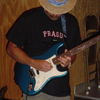Gary Burton talks about improvising:
I’ll just briefly say that I often use—we all often do, people that teach improv—we use an analogy to speech. When we talk, we don’t think about nouns and pronouns and verbs and sentence structure and so on. We just think of sort of what we want to communicate. And as we picture it, words appear in our mind and we simultaneously speak them. And that is because we’ve learned a big vocabulary of words. And the rules of grammar that we’ve assimilated and our language abilities that our brain has allows us to then use them spontaneously. We don’t have to stop and organize those sentences ourself. They just come pouring out.
The same happens for the improviser. We learn vocabulary, which is getting familiar with chords, outlines and scales. And we learn grammar, which is how the chords move from one to another and how voice leading takes place. And they get assimilated. And then the same language skill, gift, however you want to call it, works for us as improvisers.
We are playing along and something triggers—a harmonic chord change takes place and it kind of triggers a connection in our memory bank and out comes a melodic phrase that fits it. And as it comes into our conscious mind, we simultaneously play it on our instrument. It’s just like talking only we’re using a different language.
I’ll just briefly say that I often use—we all often do, people that teach improv—we use an analogy to speech. When we talk, we don’t think about nouns and pronouns and verbs and sentence structure and so on. We just think of sort of what we want to communicate. And as we picture it, words appear in our mind and we simultaneously speak them. And that is because we’ve learned a big vocabulary of words. And the rules of grammar that we’ve assimilated and our language abilities that our brain has allows us to then use them spontaneously. We don’t have to stop and organize those sentences ourself. They just come pouring out.
The same happens for the improviser. We learn vocabulary, which is getting familiar with chords, outlines and scales. And we learn grammar, which is how the chords move from one to another and how voice leading takes place. And they get assimilated. And then the same language skill, gift, however you want to call it, works for us as improvisers.
We are playing along and something triggers—a harmonic chord change takes place and it kind of triggers a connection in our memory bank and out comes a melodic phrase that fits it. And as it comes into our conscious mind, we simultaneously play it on our instrument. It’s just like talking only we’re using a different language.
BREAD IS GREAT!
PRAISE CHALLAH!!!!
PRAISE CHALLAH!!!!






